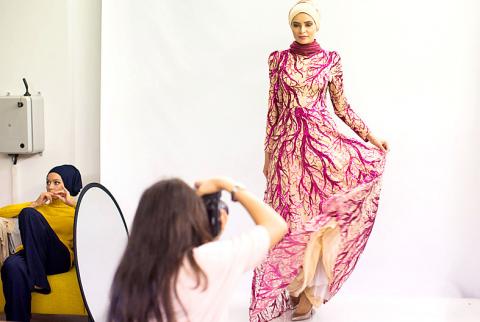The model adjusts her clothing, stares at the camera with a hint of a smile, holds her head high and the photographer starts snapping.
However, at this photoshoot on the Asian side of Istanbul, the models, impeccably made up, sport no body-hugging Western styles.
All wear headscarves and loose fitting outfits in a shoot for one of the industry’s fast growing sectors — modest, but trendy Islamic fashion.

Photo: AFP
Istanbul is positioning itself to be a hub in this nascent industry, which according to the Dubai-based Islamic Fashion and Design Council could be worth almost US$500 billion within decades.
Modanisa, a Turkish online Muslim clothing retailer, started small in 2011 and today is one of the biggest names in the market. It offers more than 30,000 products — from casual tunics to shiny evening wear to sports gear, shoes and accessories — from 300 brands and ships to 75 countries.
The firm calls itself the “first online fashion and shopping Web site for women who embrace a modest dressing style.” Modanisa chief executive Kerim Ture said that in years past there was so little choice that a religiously conservative young woman had no option but to wear the same clothes as her mother.

Photo: AFP
“If that was happening in a country [Turkey] where 99 percent of its population is Muslim, we wondered how the situation was around the world,” he added. “That’s how we’ve started our worldwide Web business.”
BURQINI BAN
Ture was surprised by this summer’s furor in strictly secular France over whether Muslim women had the right to wear the Burqini swimsuit, which covers all but the hands, feet and face.
French courts ultimately ruled that a Burqini ban by about 30 towns was “clearly illegal” and a violation of fundamental rights.
For Ture, the Burqini is not a symbol, but a choice.
“I barely understand how a country, one of whose main pillars is freedom, can oppose the Muslim swimsuit,” he said.
His firm’s catalogue offers a range of “fully closed swimsuits” starting at 40 euros (US$45), and, ironically, its Burqini sales jumped during the debate by 15 to 20 percent to France and 30 percent to the Netherlands.
In May, Istanbul hosted its first conservative fashion week at the historic Haydarpasa train station to showcase this rapidly growing market. It was organized by Franka Soeria from Indonesia, another center for Islamic clothing.
As a global consultant on modest fashion trends, Soeria decided three-and-a-half years ago to move to Istanbul — whose position straddling Europe and Asia, some say, gives it an edge.
The point of offering stylish modest clothing was not to tell people to cover up, but to show that “we are also the same as you ... we don’t want to be excluded, we don’t want to look different,” she said.
“We are showing that, hey, I am modest, I like to cover. I also like fashion. This is just my style. Just accept,” she said.
Osman Ozdemir, a Turkish designer of modest fashion, is the inhouse designer for Modanisa, but is now also working for several other firms.
“I believe Istanbul will be trend-setting on Islamic fashion,” he said. “Even high-profile and luxury brands are getting into the act.”
At the start of the year, legendary Italian fashion house Dolce & Gabbana launched its first line of hijab and abaya — some extravagantly patterned — for Muslim customers in the Middle East.
Though Turkey is a constitutionally secular state, the Islamic-rooted ruling Justice and Development Party, cofounded by Turkish President Recep Tayyip Erdogan, has advocated removing restrictions on the Muslim headscarf since it came to power in 2002.
In 2013, Turkey lifted a long-standing ban on wearing the hijab in state institutions. Last month, the government for the first time allowed policewomen to wear the headscarf under their official caps or berets.
In the conservative Fatih quarter of Istanbul, Islamic fashion stores line the streets, which are awash with billboards advertising modest styles.
“I covered my head three years ago. I didn’t want to dress up like my mother because in the past the clothes headscarf-wearing women could wear were limited,” 16-year-old shopper Seyma said. “Now I can easily find whatever I look for.”
Tourists from the Middle East are also coming to shop in Istanbul.
“I find many things: casual dresses, trousers, T-shirts and many pieces,” said Dalia, a young woman from Saudi Arabia. “I come without anything and buy from here.”
BACKLASH
Not all Turkish Muslims like the trend and see fashion as a Western tool aimed at turning Muslim women into consumer-oriented spenders.
“Islam seeks to form a modest Muslim identity, encouraging need-oriented consumption,” said Hulya Sekerci, an activist with the Free Thought and Education Rights Association, Ozgur-Der.
“On the contrary, fashion is a vicious circle encouraging excessive consumption. That’s why we are against fashion and fashion shows,” she said.
Hakan Yildiz, professor of political science at Istanbul’s Bosphorus University, said Islamic fashion stores were clearly proliferating in Turkey.
However, “we need at least a generation to see how it will evolve,” he said, adding that it would need “at least 20 years more to see if a Versace of Islam will emerge.”

HANDOVER POLICY: Approving the probe means that the new US administration of Donald Trump is likely to have the option to impose trade restrictions on China US President Joe Biden’s administration is set to initiate a trade investigation into Chinese semiconductors in the coming days as part of a push to reduce reliance on a technology that US officials believe poses national security risks. The probe could result in tariffs or other measures to restrict imports on older-model semiconductors and the products containing them, including medical devices, vehicles, smartphones and weaponry, people familiar with the matter said. The investigation examining so-called foundational chips could take months to conclude, meaning that any reaction to the findings would be left to the discretion of US president-elect Donald Trump’s incoming team. Biden

INVESTMENT: Jun Seki, chief strategy officer for Hon Hai’s EV arm, and his team are currently in talks in France with Renault, Nissan’s 36 percent shareholder Hon Hai Precision Industry Co (鴻海精密), the iPhone maker known as Foxconn Technology Group (富士康科技集團) internationally, is in talks with Nissan Motor Co’s biggest shareholder Renault SA about its willingness to sell its shares in the Japanese automaker, the Central News Agency (CNA) said, citing people it did not identify. Nissan and fellow Japanese automaker, Honda Motor Co, are exploring a merger that would create a rival to Toyota Motor Corp in Japan and better position the combined company to face competitive challenges around the world, people familiar with the matter said on Wednesday. However, one potential spanner in the works is

HON HAI LURKS: The ‘Nikkei’ reported that Foxconn’s interest in Nissan accelerated the Honda-merger effort out of fears it might be taken over by the Taiwanese firm Nissan Motor Co has become the latest buyout target in Japan as it explores a merger with Honda Motor Co and faces an overture from Hon Hai Precision Industry Co (鴻海精密), known as Foxconn Technology Group (富士康科技集團) internationally. Shares in Nissan yesterday jumped 24 percent, the most on record, to hit the daily limit, after the two Japanese automakers acknowledged that talks are ongoing to better position themselves for competitive challenges during a time of upheaval in the global auto industry. Foxconn — a Taipei-based manufacturer of iPhones, which has been investing heavily in factories to build electric vehicles — has also

CHIP SUBSIDY: The US funding would help alleviate the financial pressure from building two fabs in the US and should lift gross margins in 2026, the company said GlobalWafers Co (環球晶圓), the world’s third-largest silicon wafer supplier, yesterday said it is to receive US$406 million in subsidies from the US Department of Commerce for two new US fabs under the CHIPS and Science Act, with the first batch of the funds likely coming next year. The grant represents 10 percent of the planned investments of US$4 billion in advanced semiconductor wafer manufacturing facilities in Texas and Missouri, GlobalWafers said. The commerce department is to disburse the funds based on the completion of project milestones over a multiyear timeframe, the company said. Along with the tax credit, which is equal to